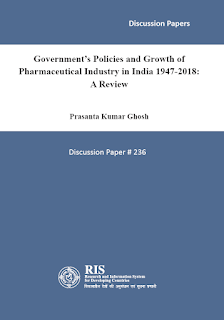Government's Policies and Growth of Pharmaceutical Industry in India 1947-2018: A Review
by Prasanta Kumar Ghosh, RIS Discussion Paper, No. 236, January 2019.
Abstract: The Indian Government policies on the development and growth of pharmaceutical industry, since India's independence in 1947 to 2018 have registered a sea-change. The establishment of the public sector undertakings (PSUs) at the beginning was to reduce foreign dependence for active pharmaceutical ingredients (APIs) . The policies framed in late 1960s and early 1970s were built on perturbed economic situation and on experience of wars and on the observations that local multinational companies (MNCs) were not ready to invest on infrastructure for APIs unless compelled to. Indian industrial laws for manufacture and trade, abatement of monopoly, control of foreign exchange outflow as also protection of intellectual property rights on inventions were framed and modified to encourage manufacturing of APIs and formulations locally with the primary aim of import-substitution; the indigenous industry was 'protected' for a long period up to 1991 by administering 'cost-plus' prices on selected APIs and formulations made there from; their imports were regulated by levying heavy import duties. The prices of essential formulations were thus controlled. The drugs prices control orders (DPCOs) from 1970 to 1994 were for maneuvering the country through price-controlled regimen of diverse kinds, from more controls to lesser control measures over years. After India joined the World Trade Organization in 1991, the legal instruments changed fast, setting the process of liberalization into motion. Industrial licensing policies were liberalized. The drugs policies and pricing measures were altered, intending to gradually move towards price- monitoring regime, as was reflected in DPCO2002 and 2013 and the draft Drug Policy 2017. Such measures led to price rise of several medicines in trade thereby raising out-of-pocket medical expenses of people. The local API industry was affected because of liberalization. The promulgation of future policies in 2019 and thereafter would have to be a judicial balancing between expectations of the consumers to have 'fair prices' of essential medicines and the concerns of the industry to remain financially healthy, and at the same time ensuring a strong API production base in India.
Keywords: Essential Drugs, Drugs Price Control Order, DPCO, Drug Policy, Indian Pharmaceutical Industry, NPPA, Industrial Licensing Policy, I(D&R) Act, R& D Incentives, Pharma R&D.

No comments:
Post a Comment